|
In my prayer life recently, God has been speaking to me a lot about obedience. Obedience to Him, to my family, to my job, to my responsibilities. Perhaps it is because I’m not very good at some of my responsibilities, or maybe it is a call to become more in tune with and to pray for God’s will.
In today’s Gospel (Mark 1:40-45), Jesus heals a man who comes to him asking to be cleaned of his leprosy. Upon healing him completely, Jesus says, “See that you tell no one anything, but go, show yourself to the priest and offer for your cleansing what Moses prescribed; that will be proof for them” (Mark 1:44). Instead, the man “began to publicize the whole manner” where it made it “impossible for Jesus to enter a town openly” (Mark 1:45). How often are we disobedient like this man? How often has Jesus told us something that we missed completely? How often have we placed our desires and actions above what God wills for us? By his choice to disobey Jesus, instead of exalting God, the healed man exalts himself. The Catechism tells us that “sin sets itself against God's love for us and turns our hearts away from it” and that sin is “opposed to the obedience of Jesus.” When the healed man ignored Jesus’ directions, it furthered him from fully understanding God’s love and mercy for him. For us, too, when we sin and choose to follow our will over the Lord’s, we distance ourselves from God’s love. How can we know God’s will for us? It is not always so easily stated to us as it was to the man who was healed of his leprosy. To know God’s will, we must pray with open and patient hearts. Pope Francis recommends that we pray for the desire to follow God’s will, to know his will and to follow it. The saints are also great models of teaching us to pray and love God’s will for us. They are in complete union with Jesus in heaven because they learned to desire, love, and follow God’s will for them throughout their earthly lives. Look to any saint, and they will show you obedience. For example, St. Maximilian Kolbe was martyred, taking the place of a man who was to be killed in Auschwitz. Before that, his writings show that his prayer life was repeatedly focused on knowing the will of God. St. Maximilian Kolbe said, “Obedience is the one and the only way of wisdom and prudence for us to offer glory to God... Let us love our loving Father with all our hearts. Let our obedience increase that love, above all when it requires us to surrender our own will. Jesus Christ crucified is our sublime guide toward growth in God’s love.” St. Maximilian Kolbe’s words and sacrifice point us towards obedience, and teach us that obedience helps us to grow in God’s love. So perhaps my prayers that are revealing obedience as a theme are leading me to stretch my heart to know and share God’s love. Through obedience, I can know Christ’s peace and mercy—the same love he felt when the man with leprosy came to him; the same love he felt when he died on the cross. It is my prayer that as the desire for obedience touches my heart, you too may know the love and joy that comes from asking God to desire his will, know his will, and follow his will. Questions for Reflection: What are some ways you can grow in obedience to God’s will this year? Are there any saints who inspire you by their willingness to follow Christ? **This post was originally published on 1/11/2018**
0 Comments
Did you know that as Catholics we commemorate the month of October as the month of the rosary? The rosary calls us to reflect on thelife of Christ through the intercession of Mary, our Blessed Mother. The rosary is an invitation for us to build a relationship with Mary, so that we can better know her son. St. Thomas Aquinas once said, “As mariners are guided into port by the shining of a star, so Christians are guided to heaven by Mary.” One way to get to know Mary is by reading about her life from scripture. Mary’s words are not recorded often, and her actions seem to skim by even more subtly. Even so, the presence of her words and actions are profound, calling us to a deeper relationship with her and her son.
First, we learn from Mary that it is okay to ask questions on our faith journey. When the angel Gabriel announces to her that she will be the mother of the Son of God, she simply asks, “How can this be, since I have no relations with a man?” (Luke 1:34). To know ourselves and have confidence in what we believe, we should always be asking questions. As a teacher, I encourage my students to ask questions all of the time. Although I am not as good as I want to be myself, from Mary I can take courage to ask more questions so that I can learn and grow in hopeful faith. When Mary questioned the angel, she learned: “Nothing will be impossible for God” (Luke 1:37). And from there, we are called to take Mary’s example of humility and trust in her “Fiat” when she says, “Behold, I am the handmaid of the Lord. May it be done to me according to your word” (Luke 1:38). The second lesson that I have learned from Mary in the Bible has had the most profound impact on my life. After the birth of her son, and in the presence of the shepherds and angels, Luke records that “Mary kept all these things, pondering them in her heart” (Luke 2:19). For me, this calls me to a life of deep reflection and intimacy with God. What I keep in my heart can move me closer to God if I invite him to share it with me: the goodness of each day, the little and big miracles, and even the hard and difficult trials. With God, everything is divine and happens with purpose; it is how I react, reflect, and let him mold me with the contents of my heart that I can become most pure. Mary is the perfect model of this. She remembers God’s glory, and holds it fast to her heart. Her life is characterized by this. I want to revel in God’s glory in all things like Mary, so that I can share this joy and love with others, and trust in his goodness when trials arise. Finally, Mary’s last words in the Bible occur at the Wedding of Cana when the reception has run out of wine. She tells her son of his time to perform his first miracle, "They have no wine" (John 2:3), and it seems as though Jesus is not convinced. But next, Mary tells the servers, “Do whatever he tells you” (John 2:5) with the utmost simplicity and confidence. Not only does she know that he is capable of great things, but she knows that her son will do great things. And so we must “do,” too. This message – “do whatever he tells you” – is a call for all of us to follow the words of Christ. Mary can only lead us to her son if we submit to his will with the trust and confidence she has modeled for us. Like Mary, we too must live our life as a Fiat, “Lord, let it be done to me according to your word.” What beautiful gifts Mary gives to us to know her faith and to let her mold us to be more like her son. Do not be afraid to let Mary be the one to lead you to Christ. She is perfect, in that she knows how to live her life for God: “Mary’s greatness consists in the fact that she wants to magnify God, not herself” (Deus Caritas Est, 41). Let her help you magnify the Lord. Today I will be praying the “Magnificat,” which is found in Luke. It is Mary’s prayer of joy and thanksgiving to God. Please join me in asking for Mary’s guidance towards her son, to lead us to a life full of grace as hers. Mary’s Magnificat “My soul proclaims the greatness of the Lord, my spirit rejoices in God my Savior for he has looked with favor on his lowly servant. From this day all generations will call me blessed: the Almighty has done great things for me, and holy is his Name. He has mercy on those who fear him in every generation. He has shown the strength of his arm, he has scattered the proud in their conceit. He has cast down the mighty from their thrones, and has lifted up the lowly. He has filled the hungry with good things, and the rich he has sent away empty. He has come to the help of his servant Israel for he remembered his promise of mercy, the promise he made to our fathers, to Abraham and his children forever.” Luke 1:46-55 *This post was originally published on 10/20/2015* Today we celebrate the feast of St. John Paul II, a saint of our times! He is remembered for many things, including his passion for the arts, outdoors, youth, and families. St. John Paul II also had a deep devotion to Mary, and in what I know of St. John Paul II’s life and loves, we can bring no greater joy in celebrating his sainthood than by honoring our blessed Mother. St. John Paul II’s favorite prayer was the Rosary, and I too, have developed a fondness for praying it. I stumbled upon a recording a couple of years ago in my desire to pray it intentionally. As I would listen and pray along in my car every morning before work, I discovered a love for each mystery and the fruit they bear, as like Mary, I “pondered them in [my] heart” (Luke 2:19, 51). The mysteries of the Rosary invite us to contemplate the life of Christ through the memories of Mary. St. John Paul II says remembering these mysteries “were to be the ‘rosary’ which she recited uninterruptedly throughout her earthly life” (Rosarium Virginis Mariae, §11). In this remembering, the account of the Gospel from the eyes of Mary are timeless, “not only belong[ing] to ‘yesterday’; they are also a part of the ‘today’ of salvation” (John Paul II, Rosarium Virginis Mariae, §13). In this, St. John Paul II reminds us that the Rosary is an invitation to participate in Christ’s divine life, and it is relevant across time to the faithful of all ages. Recently my routine for praying the Rosary has changed as I am now on maternity leave and spend the day taking care of my newborn daughter. Instead of rushing to get my two-year-old son into the car and dropped off at daycare before work and enjoying my prayer time alone in the car, we have the opportunity to hop in the stroller and walk to daycare, spending time together saying hi to neighbors and marveling at the changing of seasons before he starts his school day. Despite the enjoyment both my son and I get from these walks, in the transition of summer at home with mommy to school, and the transition from being an only child to living the realities of being a big brother at only two years old, for quite a few weeks my son was not happy about leaving home for the day. Although my son loves school, he was hating drop off, and his anxiety (and let’s be honest, mine, too) crept in the closer we got to school each day. One morning as I was trying to get him excited for the day, I asked him if he wanted to pray the Rosary with me, telling him it always brings me calm and comfort, and he said yes. I told him I would let my recording play, and I would tell him the stories of each mystery. Thus began a new routine for us each morning. As the Joyful Mysteries play, I tell him about how much Mary loved God that she said yes to being Jesus’ Mommy, and how we pray that we can love God like her and say yes to Him when he needs us to. When the Luminous Mysteries play, I tell him about Jesus’ first miracle, turning water into wine at the Wedding at Cana, and that through Mary, she will lead us to Jesus and help us see the miracles he’s performing in our own lives. In praying the Sorrowful Mysteries, I am very closely brought to tears as I think about explaining death to a toddler, and moved by Jesus’ sacrifice for us, telling my son that no sin stops Christ’s love for us. We pray to be good people and follow the will of God. And when we pray the Glorious Mysteries, I get to teach my son about the glories of the Holy Spirit and Heaven, praying for our ultimate happiness with Jesus, Mary, and all the saints. In praying these, I am in awe of how parenting is transforming my heart, teaching me to be like a little child, loving Jesus without abandon like my son does. By the time we’ve prayed our Rosary for the day, we’ve arrived at daycare. Filled with his spunky confidence and newfound graces, my son hops out of his stroller and says “let me give you a kiss for the road,” and sends me off on my way. Each day, he runs off to the playground to play with his friends, and I am amazed by the graces we’ve both received by praying the Rosary together. In his great love for both the Rosary and the family, St. John Paul II called families to pray this prayer together, acknowledging how its graces unite the family: Individual family members, in turning their eyes towards Jesus, also regain the ability to look one another in the eye, to communicate, to show solidarity, to forgive one another and to see their covenant of love renewed in the Spirit of God. Many of the problems facing contemporary families, especially in economically developed societies, result from their increasing difficulty in communicating. Families seldom manage to come together, and the rare occasions when they do are often taken up with watching television. To return to the recitation of the family Rosary means filling daily life with very different images, images of the mystery of salvation: the image of the Redeemer, the image of his most Blessed Mother. The family that recites the Rosary together reproduces something of the atmosphere of the household of Nazareth: its members place Jesus at the centre, they share his joys and sorrows, they place their needs and their plans in his hands, they draw from him the hope and the strength to go on. (Rosarium Virginis Mariae, §41) From daycare drop-offs to contemplating our family’s deepest sorrows and joys, we too as a family have found this hope and strength of the Rosary to be true and timeless. On this Feast of St. John Paull II, I invite you to honor him and our Blessed Mother by taking the time to pray the Rosary, finding twenty minutes of your time to devote to contemplating the face of Jesus. St. John Paul said, “a prayer so easy and yet so rich truly deserves to be rediscovered by the Christian community… I look to all of you, brothers and sisters of every state of life, to you, Christian families, to you, the sick and elderly, and to you, young people: confidently take up the Rosary once again. Rediscover the Rosary in the light of Scripture, in harmony with the Liturgy, and in the context of your daily lives” (Rosarium Virginis Mariae, §43). Know of my unending prayers for you as you begin this rediscovery of the Rosary for yourself, as with Mary, you too ponder these mysteries in your heart and recognize their fruits in your life. St. John Paul II, pray for us! Our Lady of the Rosary, pray for us! Recently at Mass, our priest explained the love of God as Father in a way that I had never heard before. As a parent and teacher, I resonated with his words deeply. In the Gospel, Jesus sent out 72 disciples in pairs to share the good news (Luke 10:1-12, 17-20). They came back rejoicing in all that they could do - like cast out demons - because of the name of Jesus. But our priest reminded us that this is because of God’s glory, not ours. In fact, Jesus didn’t even need the 72 if he didn’t want them. As God, he could share the Gospel on his own to the whole world, in an instant. But instead, he finds it more beautiful and meaningful to have them and us share in ministry. Yes, it is also messy, but love shared is so much more fruitful. Our priest gave many examples of how a parent lets their child help with chores. I experienced the same “I want to help!” one day as I was cutting strawberries. I could have done it in five minutes by myself, or I could let my two-year-old son help—knowing that this would take much longer, that there would be more to clean up, and that I would have to take a lot more precautions. But I sat him on the counter, and he started taking off stems as I washed the strawberries. He took a turn washing some, too. He let me cut the strawberries, but he said he would put them in the container for me. And what a delight it was to remind him how helpful he was, to have him remind me that “we have to be safe” while using a knife, to see him eat a few strawberries along the way and remark on how yummy they were, and to see the joy on his face when he put the lid on our bowl of cut up strawberries and help put them in the fridge. In the same way, God lets us help him prepare strawberries, too. He delights in our imperfect attempts to help and love, to share in his ministry, wherever it is that he has called us to serve. As I write this, it is the second anniversary of my son’s baptism. It is not lost on me what a gift and responsibility it is to raise our children in the faith: to be nurturing saints for heaven alongside my husband and how grateful I am to our community near and far who support us along the way. But again, I am reminded that God could raise our children much better than us (just ask me about tooth brushing or navigating toddler discipline). But he lets us do so and he gives us love and mercy and grace to accompany us day after day. This grace is found abundantly in the sacraments. I pray that we teach and model to our children that we can always call upon that grace, and that they have a desire to participate in it. I pray that they may say to God, “I want to help!,” knowing that all is for God’s glory—not theirs – and that through Him all things are possible. At the end of the Gospel, Jesus reminds the 72 to “rejoice because your names are written in heaven” (Luke 10:20). My prayer for my children – and for each of us as we celebrate the gift of our baptisms, is that we always know that we are loved, wanted, and called. May we know that by the gift of baptism, our names, too, can be written in heaven. To my son, I pray that you’ll always want to help prepare strawberries with me and with God. Thank you for teaching me about childlike faith in a whole new light. Thank you for letting me help God – even though imperfectly – by raising and loving you. It is mine and your father’s greatest joy to serve God through the gift of our children’s lives. It’s 4:30 in the morning and my husband and I are awoken by cries from our 11-month-old son in his room. He has taken to an early wake-up for quite a few weeks and despite knowing that he’s been sick and teething and that babies simply have no schedule but their own, I think to myself, “Shouldn’t he be sleeping through the night?” My husband brings him to me to nurse and slips back into bed. Although this trial of losing sleep is trivial I pray, “Lord, we have given up everything and followed you.”
The other day we got the news that our car needs another expensive repair. My husband and I analyzed our budget: there’s the mortgage, daycare, food, regular car expenses, and student loans. We also want to have more children and show them the world, and we want to give so much more to our community than we currently are, but where is there room in our constantly strained budget? I express my fear and I cling to the words, “Lord, we have given up everything and followed you.” Today’s Gospel catches us right after a rich man asks Jesus what he must do to inherit eternal life, and “Jesus, looking at him, loved him and said to him, ‘You are lacking in one thing. Go, sell what you have, and give to [the] poor and you will have treasure in heaven; then come, follow me’” (Mark 10:21). I can hear Peter, filled with earnest love and total concern as he looks up to Jesus and begins to say the opening line of today’s Gospel: “We have given up everything and followed you.” He has left his family and career to serve Jesus. He is traveling with these men and learning from Jesus every day. His faith is tested, and he fails multiple times – walking on and beginning to drown in the sea and eventually to deny the Lord not once, but three times over at His Passion. Despite these failings, I imagine the Lord’s tenderness and faithfulness as he looks to Peter and says: “Amen, I say to you, there is no one who has given up house or brothers or sisters or mother or father or children or lands for my sake and for the sake of the gospel who will not receive a hundred times more now in this present age: houses and brothers and sisters and mothers and children and lands, with persecutions, and eternal life in the age to come. But many that are first will be last, and [the] last will be first.” (Mark 10:29-31) This is the promise of the Christian life: the gift of hope that comes with the witness of the Gospel and the life of Christ. Despite our sufferings, trials, and sacrifices, there’s the promise of eternal life with Jesus where every ache of our heart will be healed and every thirst satiated. Consider the fear and hurt, for example, of those who feel called to marriage, but haven’t yet found “the one.” Or how about the tears an infertile couple might shed for all the babies they have never held? God fills these holes and seals them one hundred times over. Even something that seems trivial, such as a failing grade, a mistake at work, or sleep lost during a 4:30 a.m. nursing session – even those losses will be fulfilled in ways that we cannot imagine. It’s hard to fathom how that wholeness is possible in our broken world, but as Jesus reminds us: “All things are possible for God” (Mark 10:27). In contemplating Jesus’ promise to us, this call to the Christian life, and our goal of striving towards heaven, we know that this work is not easy or glamorous, but it can be holy if we let it. In your everyday yeses to sacrifices big and small, God promises you a lifetime with Him. Do not lose hope when you make a sacrifice or you feel the hurt in your heart: it is seen and felt and loved by the Lord. He uses those feelings to bring you closer to Him and His promises. He wants to love you in your sacrifices. The Lord promises to bring His goodness through your holy work as you choose Him each day (Romans 2:6-10). And it is in that love that we can sacrifice with the confidence of Christian hope and gratitude, “Lord, we have given up everything and followed you.” Alyce Shields is a teacher in Washington, D.C. In my prayer life recently, God has been speaking to me a lot about obedience. Obedience to Him, to my family, to my job, to my responsibilities. Perhaps it is because I’m not very good at some of my responsibilities, or maybe it is a call to become more in tune with and to pray for God’s will.
In today’s Gospel (Mark 1:40-45), Jesus heals a man who comes to him asking to be cleaned of his leprosy. Upon healing him completely, Jesus says, “See that you tell no one anything, but go, show yourself to the priest and offer for your cleansing what Moses prescribed; that will be proof for them” (Mark 1:44). Instead, the man “began to publicize the whole manner” where it made it “impossible for Jesus to enter a town openly” (Mark 1:45). How often are we disobedient like this man? How often has Jesus told us something that we missed completely? How often have we placed our desires and actions above what God wills for us? By his choice to disobey Jesus, instead of exalting God, the healed man exalts himself. The Catechism tells us that “sin sets itself against God's love for us and turns our hearts away from it” and that sin is “opposed to the obedience of Jesus.” When the healed man ignored Jesus’ directions, it furthered him from fully understanding God’s love and mercy for him. For us, too, when we sin and choose to follow our will over the Lord’s, we distance ourselves from God’s love. How can we know God’s will for us? It is not always so easily stated to us as it was to the man who was healed of his leprosy. To know God’s will, we must pray with open and patient hearts. Pope Francis recommends that we pray for the desire to follow God’s will, to know his will and to follow it. The saints are also great models of teaching us to pray and love God’s will for us. They are in complete union with Jesus in heaven because they learned to desire, love, and follow God’s will for them throughout their earthly lives. Look to any saint, and they will show you obedience. For example, St. Maximilian Kolbe was martyred, taking the place of a man who was to be killed in Auschwitz. Before that, his writings show that his prayer life was repeatedly focused on knowing the will of God. St. Maximilian Kolbe said, “Obedience is the one and the only way of wisdom and prudence for us to offer glory to God... Let us love our loving Father with all our hearts. Let our obedience increase that love, above all when it requires us to surrender our own will. Jesus Christ crucified is our sublime guide toward growth in God’s love.” St. Maximilian Kolbe’s words and sacrifice point us towards obedience, and teach us that obedience helps us to grow in God’s love. So perhaps my prayers that are revealing obedience as a theme are leading me to stretch my heart to know and share God’s love. Through obedience, I can know Christ’s peace and mercy—the same love he felt when the man with leprosy came to him; the same love he felt when he died on the cross. It is my prayer that as the desire for obedience touches my heart, you too may know the love and joy that comes from asking God to desire his will, know his will, and follow his will. Questions for Reflection: What are some ways you can grow in obedience to God’s will this year? Are there any saints who inspire you by their willingness to follow Christ? Alyce Shields is a teacher in Washington, D.C. When my husband and I were preparing for marriage, we spent time in reflection and prayer carefully choosing our Mass readings. It was such an exciting decision to make, and we prayed that the readings would reflect and inspire us in our marriage and all whom we would witness to by our marriage. Some of these same readings will be read at Masses across the world on the upcoming feast of the Holy Family, serving as a reminder of how we can live as reflections of the Holy Family in our daily lives. In the second reading, Paul tells the Colossians, “Put on, as God's chosen ones, holy and beloved, heartfelt compassion, kindness, humility, gentleness, and patience” (Col 3:12). Just like Mary, Joseph, and Jesus, we are God’s beloved, chosen and loved by God, and with that, we are called to live by these same virtues that Paul shares with the Colossians. The stories of Mary and Joseph consistently show us their lives of humility and gentleness. I think of Mary’s fiat (Luke 1:38), Joseph’s obedience to the angel of the Lord (Matthew 1:24), or how Mary and Joseph took Jesus to be presented in the temple in this weekend’s Gospel (Luke 2:22-40). Just like Mary and Joseph, we are called to serve and love God with faithfulness that is radical, but gentle and sweet. What does this faithfulness look like? For the Holy Family, not only did it manifest in the stories we read about in Scripture, but also in the mundane moments of the every day. Mary nursed Jesus as an infant, Joseph taught him carpentry, and Jesus served his parents and brought them joy! Jesus carried this love in his ministry that nurtured all to whom he preached, and it continues to carry on in the legacy of the Church. These little acts of faithfulness yielded enormous fruits and carried the Holy Family through times of immense suffering. As I feel overwhelmed with my day to day duties of family life as a wife and mother, or my job as a teacher, I find comfort in knowing that perhaps Mary and Joseph felt these demands, too. They were faithful to their vocations, to each other, and to the Lord. Life is a balancing act, but with “Christ dwell[ing] in you richly,” like the Holy Family, all can be done in love, “do[ing] everything in the name of the Lord Jesus” (Col 3:17). You show faithfulness when you do the dishes, when you submit an assignment for work or school, when you make the bed. You show faithfulness when you play with your children, when you have coffee with a friend, when you stop and pray. You show faithfulness when you show up to Mass. Opportunities for faithfulness, humility, and gentleness are in the every day, both big and small. Through these opportunities for faithfulness I have learned that God is never outdone in generosity. He wants to bless us and let us know His love, and He does this in the most profound way when we show Him our faithfulness and love, just as the Holy Family has modeled for us. As we continue to navigate the demands of our daily lives, let us cling to the intercession of the Holy Family, that we may be gentle and humble, showing radical faithfulness in all that we do. Question for Reflection: What are some opportunities to show for faithfulness in your life? For more resources on Marriage and Family, click here. Alyce Shields is a teacher in Washington D.C.
Today we celebrate the feast day of St. Gianna Beretta Molla, a wife, mother, and physician who gave the ultimate sacrifice of her life for her infant daughter. She is also one of my most trusted role models as a Christian, wife, and mother.
When I graduated with my master’s degree, my husband gave me a print of a quote of St. Gianna that reads, “Whatever God wants.” It hangs by my bedside table and is often my first short prayer as I get out of bed in the morning. It was very fitting for the journey that we had just begun: my husband and I had been married for almost an entire year and I had just finished a rigorous graduate program. Meanwhile, we were coping with the loss of my father, who had passed 6 months prior. With such joy, stress, and suffering, I often turned to this prayer of St. Gianna as a deep source of hope and consolation to remind me of God’s sovereign love and guidance in my life. I continue to turn to this prayer as God’s will for my life unfolds. St. Gianna did not say “whatever God wants” with apathy but with joyful submission to Christ’s work in her life and confidence in God’s goodness. At her canonization, Pope St. John Paul II described her witness as a “significant messenger of divine love.” From her writings and letters, we know her love for God and her family was fervent and passionate. In a letter written to her future husband during their engagement, she said she would often pray, “Lord, you see my desire and my good will. Supply what is lacking and help me to become the wife and mother you desire.” Her letters to her husband often express their deep desire to raise a family that would love and serve the Lord with all of their hearts. They would soon have a son and three daughters. During St. Gianna’s final pregnancy, doctors discovered a fibroid tumor in her uterus. St. Gianna’s life could be easily saved by an abortion or a hysterectomy, or she could undergo a risky operation to remove the tumor and save her baby. St. Gianna chose to save her baby. However, the impending birth could mean life or death for both St. Gianna and her unborn child. She consistently told her husband, “If you must decide between me and the child, do not hesitate: choose – I insist – the child.” And indeed, St. Gianna’s daughter who lived due to her mother’s sacrifice is a living testimony to her mother’s deep love for her children and her trust in God’s will. Of her sacrifice, Pope St. John Paul II said this: Following the example of Christ, who "having loved his own... loved them to the end" (Jn 13: 1), this holy mother of a family remained heroically faithful to the commitment she made on the day of her marriage. The extreme sacrifice she sealed with her life testifies that only those who have the courage to give of themselves totally to God and to others are able to fulfill themselves. It is clear that her courage and love did witness to her simple prayer, “whatever God wants.” As life has continued to present new joys, stresses, and sufferings, my husband and I continue to reflect on St. Gianna’s prayer that hangs in our bedroom: “Whatever God wants.” In eagerly awaiting the birth of our unborn son, our hope, like St. Gianna and her husband’s, is that we can raise him and our future children with a deep love for the Lord and total trust in his providence as we pray in confidence, “Whatever God wants.” We hope that through living out our vocation of marriage amidst the ups and downs of life, our love is another witness to our children, family, and friends of God’s faithfulness as we pray, “Whatever God wants.” “Whatever God wants” is not a prayer of defeat or carelessness. For St. Gianna, it was a prayer of courage, strength, and complete trust in the power of God. May we, too, come to find the joy of this submission and love for Christ. St. Gianna, pray for us! Alyce Shields is a teacher in Washington D.C *The blog post below was co-authored by Nicholas and Alyce Shields, who have been married since June 2015. The italicized text was written by Alyce, while the rest was written by Nicholas.
Almost 11 years ago, Alyce and I walked into our first high school class together and the rest was history… just kidding. While I wish it was that easy, living out your vocation is never easy. Although we are each called to a vocation by virtue of our Baptism, discerning that vocation is no mean feat. It takes time, patience, and community. Pope Francis said in his message for the 53rd Day of Prayer for Vocations, “Vocations are born within the Church … Vocations grow within the Church … Vocations are sustained by the Church.” The Body of Christ provides a wonderful example for us of the diversity of our vocations, and our church community is beautiful place in which to discern. Discernment is a very personal journey, yet we can greatly benefit from looking to one another and to those who have made this journey before us for guidance. Not only can we look to our priests and religious, but to our parents and grandparents as well! Discernment is not restricted to the priesthood or religious life, but also includes the call to marriage or consecrated single life! Alyce and I did not enter marriage blindly; we discerned our calling, discussed it with our family, friends, priests, and with each other before we took the next step. Because we discerned our vocation together, we strengthened our faith and developed our relationship with each other while being centered on Christ. What did that discernment look like? While it’s different for many, for us, it took waiting and time. In our four years of dating long-distance, God taught us patience and dependence on him. Nicholas and I learned of God’s faithfulness, that his love and promises are never outdone in generosity. In the many days of waiting, I found myself relying on the hope that if God calls something to be, He will make a way. Additionally, the greatest “I love you” that Nicholas and I would say for each other was this: “I’ll see you in the Eucharist.” This means that as members of the Body of Christ – which is the community of the Church that Nicholas previously mentioned – we are united through Jesus in his physical presence even though we were over a thousand miles apart. We learned that our identities reside in Christ and that our gaze must be fixed on him. This outlook, a relationship centered on Christ, does not just apply to dating and discernment, but also on marriage and family life. We have gotten engaged, survived long-distance, gotten married, are awaiting the birth of our first child, and we are still working to keep our lives centered on Christ. Living our vocation means that day after day, we must see each other in the Eucharist. In both times of joy and sorrow, our marriage has been strengthened through shared prayer and reliance on Christ. When we slack on the effort of making Christ the priority, we find ourselves bitter and sluggish. When we cling to Christ, we are more in tune with each other and find that we really live out the goal of helping each other get to heaven. With Christ, we can serve each other with the truest of loves and find confidence in God’s promises continually being revealed to us. We are so blessed to be journeying towards God together and sharing his love with those we encounter. None of this is easy, but it is necessary and worth it. For inspiration, Alyce and I often look to the Holy Family as a model of how we want our own marriage and family to be. Mary and Joseph had total trust in the Lord and put their lives in His hands. We strive to do this each and every day as we pray together, encourage each other, and serve one another. No matter where you are in your discernment, we encourage you to keep Christ at the center, to pray, and to trust in the Lord. Pope Saint John Paul II put it best, “Love Christ and love the Church! Love Christ as he loves you. Love the Church as Christ loves her. Do not forget that true love sets no conditions; it does not calculate or complain but simply loves.” Alyce Shields is a teacher and Nicholas Shields is a Young Professional in Washington, D.C. They have been married since June 2015. I have always admired Mother Teresa and her incredible mission, along with her reflective heart. I am so happy that I can now call upon her as St. Teresa of Calcutta, as she was just canonized on September 4, 2016! As I have studied and learned more about her, it seems as if St. Teresa of Calcutta would have dreaded knowing of her public canonization! She never wanted her writings or her work to bring attention to herself, but rather, she only desired to bring hearts to Jesus Christ. In her honor, I want to reflect on how her understanding of the world can bring our focus less on her and bring our hearts to Jesus. St. Teresa of Calcutta taught us that God is in every living thing. She wrote, “Seeking the face of God in everything, everyone, all the time, and his hand in every happening; This is what it means to be contemplative in the heart of the world. Seeing and adoring the presence of Jesus, especially in the lowly appearance of bread, and in the distressing disguise of the poor” (St. Teresa of Calcutta, In the Heart of the World: Thoughts, Stories and Prayers). Furthermore, St. Teresa of Calcutta taught us to seek Christ in every person we encounter. She recognized that each human being is created uniquely and beautifully. Each person is the face of God calling us to serve God by serving them. As Jesus said, “I was hungry and you gave me food, I was thirsty and you gave me drink, a stranger and you welcomed me, naked and you clothed me, ill and you cared for me, in prison and you visited me’” (Matthew 25:34-36). When we love through the corporal and spiritual works of mercy as St. Teresa of Calcutta did, we are better able to see God more clearly in others. Imitating Christ by practicing the works of mercy also invites us to and see him more clearly in the Eucharist. Receiving Jesus in the Eucharist was essential for St. Teresa of Calcutta, as she knew Jesus was the fuel to teach her how to love others better and bring more souls into God’s embrace. She recognized that Christ’s love lives on in his humility of becoming our Eucharistic food and in the hearts of the poor, which includes the physically, mentally, and spiritually poor. Bringing souls to Christ was a deep mission of St. Teresa of Calcutta. She consistently reflected over two of Jesus’ last words of his Passion – “I thirst” – and had them written next to the crucifixes in the chapels of the Missionaries of Charity (the religious order St. Teresa of Calcutta established in 1950) to remind her sisters that their mission was to satiate Christ’s thirsts for souls. When going to Jesus at the Cross, St. Teresa of Calcutta wanted us to feel his thirst and love for us. She believed that Christ wants us to rest in his love. St. Teresa of Calcutta left behind a deep legacy of letting the world know just how loved and treasured we are. Her message teaches us that God loves us deeply and thirsts for us. When we know we are deeply loved by God, we can endure any suffering because we know joy is possible in the midst of carrying our own crosses. St. Teresa of Calcutta felt the pain of Jesus’ Passion deeply in her work in the slums of Calcutta and in the contemplations of her heart. She witnessed suffering first-hand taking care of the poorest of the poor and also experienced feelings of desolation and dryness in the spiritual life. Throughout it all, her joy remained full and she devoutly loved the Lord. St. Teresa of Calcutta is a beautiful witness of the mystery of suffering with Christ joyfully. As we contemplate the great love, faith, and work of St. Teresa of Calcutta , we can pray with one of her favorite prayers: The Memorare. With such deep trust for God, she was consistently confident in the Lord’s ability to work miracles. Often, she prayed an “emergency novena,” praying nine Memorares in a row and a tenth in thanksgiving to God for a holy request. With confidence in our Lord, and thanksgiving for the testimony of St. Teresa of Calcutta, let us run to Jesus through Mary, that we may become steadfast in holiness, find joy in suffering, quench the thirst of Christ, and be confident in the good work that God is doing within us! Remember, O most gracious Virgin Mary, that never was it known that anyone who fled to thy protection, implored thy help, or sought thine intercession was left unaided. Inspired by this confidence, I fly unto thee, O Virgin of virgins, my mother; to thee do I come, before thee I stand, sinful and sorrowful. O Mother of the Word Incarnate, despise not my petitions, but in thy mercy hear and answer me. St. Teresa of Calcutta, pray for us! Alyce Shields is a teacher in Washington D.C.
“Let the word of Christ dwell in you richly, as in all wisdom you teach and admonish one another, singing psalms, hymns, and spiritual songs with gratitude in your hearts to God.” –Colossians 3:16
How do you get to know Jesus the person? How do you get to know God? The Holy Spirit? As Catholics, we are called into an intimate relationship with Christ. Jesus wants for us to know him, and so he left us with the gift of the Eucharist so that we would never be without his physical presence. God can reach us in the silence of his presence. Even so, sometimes it is hard to know what God is saying to us, and it can be difficult to interpret God’s will for our lives. One way of building an intimate relationship with God and interpreting his will is by letting the word of Christ dwell richly within us (cf. Col. 3:16). It is in Scripture that we can get to know Jesus the person: his thoughts, his stories, and his deep love for us. The Bible is important because it is where we can study God, get to know him, and understand his will for our lives. He has left us with words of instruction, comfort, welcome, prayer, and love. Knowing the words of God, his Son, his prophets, and his saints can guide us through life’s joys, trials, and periods of stillness. In the Word of God, we can hear God speaking to us in ways that answer our prayers and help prepare us to be apostles. St. Paul told Timothy that knowing Scripture was essential for living a life of faith: “From infancy you have known [the] sacred scriptures, which are capable of giving you wisdom for salvation through faith in Christ Jesus. All scripture is inspired by God and is useful for teaching, for refutation, for correction, and for training in righteousness, so that one who belongs to God may be competent, equipped for every good work.” -2 Timothy 3:15-17 By “letting the word of Christ dwell in [us] richly,” we can better know Jesus and become more fully “equipped for every good work.” I think about this and my relationship with Christ, and I realize that Christ knows me better than I know him. I lament to him unceasingly, but I don’t always run to Scripture. As I have been taking the time to study God and his Word, I find that my trust in the Lord has strengthened, and I see his love more fully. When I find Scripture that speaks to me and I cling to it – whether it’s through memorization and praying it to myself, setting a verse as my phone background, or making it visible in my apartment – I am filled with patience and peace because I know I have the Word of God and his Spirit with me. I want to challenge you to get to know Jesus better through Scripture. I once witnessed a talk where the speaker reminded us that the Spirit of God speaks to us in the four Gospels (Matthew, Mark, Luke, and John). In addition to prayer, the sacraments, or Christian community, Scripture is where Christ himself reaches out to us. If we took just five minutes a day to read from a Gospel, that would be over 30 hours of quality time with Jesus in a year. We could read 10 minutes a day, and that would be over 60 hours with Jesus in a year! Even by starting with baby steps, we can build a relationship and truly call Christ our friend. Jesus himself tells a parable of a sower planting seeds, where he explains “the seed is the word of God” (Luke 8:11). For the seed that fell within rich soil, “it produced fruit a hundredfold” (Luke 8:8) and they “are the ones who, when they have heard the word, embrace it with a generous and good heart, and bear fruit through perseverance” (Luke 8:15). May your heart be open and receptive to the Word of God so that it may bear much fruit in you and in the world! In Scripture, Jesus says: “And I tell you, ask and you will receive; seek and you will find; knock and the door will be opened to you” (Luke 11:9). Today, I am asking Jesus to let me know him better through his Word as I commit to five minutes of Scripture reading a day. It will require me to be vulnerable and take action, but in doing so, I open myself to the transforming love of Christ that enables us to become better apostles. If you are not sure where to start, there are many great resources for reading the Church’s daily readings or the Divine Office, which is the Church’s daily prayer comprised of Scripture. When all else fails, just open your Bible and start reading! You can even start by reading the Parable of the Sower in Luke 8:4-15! I pray that God will give you the grace to know his Son through Scripture. May your reading of Scripture lead to a deepened friendship with Christ, creating fruitful soil that bears much fruit! For more resources on Prayer and Catechesis, or to read the Daily Mass Readings, please click here. Alyce Shields is a teacher in Washington D.C. "To let our lives speak a story of evangelization, to live out the Gospel, we must humble ourselves like Mary who lived as a handmaiden of the Lord."
Does your life speak a story of evangelization? I think about this question, and it is easy to think about the moments where I have really fallen short. I could have been kinder and more loving with a student who really needed me today. I could have been quicker to help a colleague in need. I know that I have missed clear opportunities to be Christ to others. As Christians in the age of the New Evangelization, we have been called more than ever to think about these moments and act with grace to better love God and share his love with others. The story of the Visitation deeply teaches us about bringing Christ to others. Mary has just learned that she is with child; yet she travels to Judah after she finds out that her relative, Elizabeth, is six months pregnant in her old age. Although Luke does not elaborate on the details, we can only imagine the sacrificial love beaming through this selfless act: Mary, in her first trimester of pregnancy (which is often filled with morning sickness and other trials), gives up time at home to care for a fellow expecting mother. Her heart is filled with joyful love as she physically brings Jesus to Elizabeth and her family. She is the “Theotokos,” or God Bearer. Elizabeth affirms Mary’s faithfulness and the gift of bringing Christ to her: When Elizabeth heard Mary’s greeting, the infant leaped in her womb, and Elizabeth, filled with the holy Spirit, cried out in a loud voice and said, “Most blessed are you among women, and blessed is the fruit of your womb. And how does this happen to me, that the mother of my Lord should come to me? For at the moment the sound of your greeting reached my ears, the infant in my womb leaped for joy. Blessed are you who believed that what was spoken to you by the Lord would be fulfilled.” Luke 1:41-45 It is clear that Mary’s life speaks a story of evangelization to others. Mary’s life and witness call us to be God Bearers to others, too. This may manifest in a physical way, as Mary physically brought Jesus in her womb to Elizabeth. During my time as a Catholic missionary for middle school and high school students, we reflected on the Visitation by bringing a friend to kneel with us in front of Jesus in the Eucharist in Adoration, physically bringing those we love closer to Christ. It was so humbling, and deeply moving to physically soak up Christ’s presence by being brought to him by someone you love. Perhaps Mary’s evangelization story calls you to bring others to Christ physically in the Eucharist, inviting a friend to attend Mass or Adoration with you. In this Jubilee Year of Mercy, Pope Francis explained in his Lenten message that “in the corporal works of mercy we touch the flesh of Christ in our brothers and sisters who need to be fed, clothed, sheltered, visited” (Pope Francis, 2015). Perhaps in your evangelization story you are called to serve those who need to know or be reminded of Christ’s love by your service. Whether directly or indirectly, as Catholics we trust that God makes every gift and sacrifice more perfect when done in his name. To let our lives speak a story of evangelization, to live out the Gospel, we must humble ourselves like Mary who lived as a handmaiden of the Lord. When we submit to the will of God and “do whatever he tells you” (John 2:5), surely we make Christ’s presence more known to others. Today we are called to let our lives speak a story of evangelization, just as the Visitation teaches us. We can entrust ourselves to Mary’s mission of bringing Christ to others, and know that through her patronage and guidance, our attempts to bring Christ to others will bear fruit in more lives than one. Pope Saint John Paul II entrusted his papacy to Mary with the simple prayer, “Totus Tuus,” or “totally yours,” knowing that Mary leads all hearts to her son, Jesus Christ. Let us, too, live in the spirit of the Visitation and follow the great evangelizers who have brought us closer to Jesus through Mary. Let your life speak a story of evangelization. To learn more about our call to let our lives speak a story of evangelization, visit our New Evangelization Resources page. Alyce Shields is a teacher in Washington D.C Did you know that as Catholics we commemorate the month of October as the month of the rosary? The rosary calls us to reflect on the life of Christ through the intercession of Mary, our Blessed Mother. The rosary is an invitation for us to build a relationship with Mary, so that we can better know her son. St. Thomas Aquinas once said, “As mariners are guided into port by the shining of a star, so Christians are guided to heaven by Mary.” One way to get to know Mary is by reading about her life from scripture. Mary’s words are not recorded often, and her actions seem to skim by even more subtly. Even so, the presence of her words and actions are profound, calling us to a deeper relationship with her and her son.
First, we learn from Mary that it is okay to ask questions on our faith journey. When the angel Gabriel announces to her that she will be the mother of the Son of God, she simply asks, “How can this be, since I have no relations with a man?” (Luke 1:34). To know ourselves and have confidence in what we believe, we should always be asking questions. As a teacher, I encourage my students to ask questions all of the time. Although I am not as good as I want to be myself, from Mary I can take courage to ask more questions so that I can learn and grow in hopeful faith. When Mary questioned the angel, she learned: “Nothing will be impossible for God” (Luke 1:37). And from there, we are called to take Mary’s example of humility and trust in her “Fiat” when she says, “Behold, I am the handmaid of the Lord. May it be done to me according to your word” (Luke 1:38). The second lesson that I have learned from Mary in the Bible has had the most profound impact on my life. After the birth of her son, and in the presence of the shepherds and angels, Luke records that “Mary kept all these things, pondering them in her heart” (Luke 2:19). For me, this calls me to a life of deep reflection and intimacy with God. What I keep in my heart can move me closer to God if I invite him to share it with me: the goodness of each day, the little and big miracles, and even the hard and difficult trials. With God, everything is divine and happens with purpose; it is how I react, reflect, and let him mold me with the contents of my heart that I can become most pure. Mary is the perfect model of this. She remembers God’s glory, and holds it fast to her heart. Her life is characterized by this. I want to revel in God’s glory in all things like Mary, so that I can share this joy and love with others, and trust in his goodness when trials arise. Finally, Mary’s last words in the Bible occur at the Wedding of Cana when the reception has run out of wine. She tells her son of his time to perform his first miracle, "They have no wine" (John 2:3), and it seems as though Jesus is not convinced. But next, Mary tells the servers, “Do whatever he tells you” (John 2:5) with the utmost simplicity and confidence. Not only does she know that he is capable of great things, but she knows that her son will do great things. And so we must “do,” too. This message – “do whatever he tells you” – is a call for all of us to follow the words of Christ. Mary can only lead us to her son if we submit to his will with the trust and confidence she has modeled for us. Like Mary, we too must live our life as a Fiat, “Lord, let it be done to me according to your word.” What beautiful gifts Mary gives to us to know her faith and to let her mold us to be more like her son. Do not be afraid to let Mary be the one to lead you to Christ. She is perfect, in that she knows how to live her life for God: “Mary’s greatness consists in the fact that she wants to magnify God, not herself” (Deus Caritas Est, 41). Let her help you magnify the Lord. Today I will be praying the “Magnificat,” which is found in Luke. It is Mary’s prayer of joy and thanksgiving to God. Please join me in asking for Mary’s guidance towards her son, to lead us to a life full of grace as hers. Mary’s Magnificat “My soul proclaims the greatness of the Lord, my spirit rejoices in God my Savior for he has looked with favor on his lowly servant. From this day all generations will call me blessed: the Almighty has done great things for me, and holy is his Name. He has mercy on those who fear him in every generation. He has shown the strength of his arm, he has scattered the proud in their conceit. He has cast down the mighty from their thrones, and has lifted up the lowly. He has filled the hungry with good things, and the rich he has sent away empty. He has come to the help of his servant Israel for he remembered his promise of mercy, the promise he made to our fathers, to Abraham and his children forever.” Luke 1:46-55 Alyce Shields is a teacher in Washington, D.C. We are about two weeks into our Lenten sojourn, and I’m not sure about your experience so far, but I know that it has already been a challenge for me. And that’s good! I wanted this Lent to more closely unite me to the Cross of Christ, not just for these forty days, but beyond this season, and God is answering this prayer in ways that I could never expect. In fact, he is delivering me from my own crosses so that I may know joy through this suffering.
So far, I’ve been able to take away two important lessons from my Lenten journey so far:
Life is hard. Our days are filled with many demands, and sometimes we fail to meet them. People will disappoint us. We may hurt others by our words or actions. We find ourselves exasperated, or at times feeling hopeless. But the one who hopes in the Lord knows that all of these trials of being human bring us to the Cross and teach us sacrificial love. This weekend at mass I was told, “Lent is a school of charity. Life is a school of charity” (Msgr. Andrew Wadsworth). As we navigate these crosses, God is literally stretching our hearts to be open to love – the love of the Cross – so that when we reach heaven, our hearts are like Christ’s sacred heart. And if he stretches our hearts through pain and sorrow, imagine how much God stretches our hearts through hope and joy! Through every trial and every gift we are being molded to become more Christ-like, capable of infinite love. If we could truly fathom this infinite love that God is preparing us for, we would live life on our knees in awe of the Cross. Truly we can say that life is a school of love, a school of charity. The readings today teach us how we can plant our roots to let the Lord more fully direct our lives. We are consistently given the image of a tree whose roots are planted near running water. This tree’s leaves never fade, and in even drought, it still bears fruit. For me, this tree represents my cross, whose confidence must rely solely in the Lord. God can only keep my leaves evergreen if I live off of his waters, God will perform miracles in my life if I let him. Truly letting go of my pride and independence is so hard, yet extremely humbling. It truly takes confidence and prayer. In this school of charity, I’ve learned that even the simplest of prayers can help me submit my cross to God each day: “Multiply my time, Lord,” or “Let me see you where you need me to.” When I say these prayers and trust God to fulfill them, he does. He’s stretching my heart to know his love. He carries my crosses for me. Truly, I am a mere student in this school of charity. As you pray today over your takeaways from Lent so far, I pray that you come to find peace in how the Lord is trying to carry your cross through His school of charity, and that you call upon the grace to let him do so. I pray that you reflect on where your tree is planted and that you want to live by God’s living streams. Ultimately, I pray that you know how loved you are. You are so loved that God is stretching your heart so that you may become more like him. He wants you to know infinite love, who is our Lord Jesus himself. “I pray that you, being rooted and firmly established in love, may be able to comprehend with all the saints what is the length and width, height and depth of God’s love.” – Ephesians 3:17-18 Alyce Anderson is a teacher in Washington, D.C. Today, the largest pro-life movement in the world will occur as thousands march the National Mall in Washington, DC, peacefully and passionately for the sake and sanctity of human life. Every year, the March for Life occurs on the anniversary of the historic Roe v Wade decision that made abortion legal in all 50 states. Despite the sorrow that fills the memory of this day, we have been called, as a community of life, to stand with zeal (word choice) for everyone’s right to life, not just this day, but every day of our lives.
I have never participated in the March for Life before, but I am very excited to finally take part in some of the activities that are occurring this week in our nation’s capital. From hosting eager pilgrims coming from Texas to march, to pro-life talks and dinners, and the National Prayer Vigil for Life, it has been an inspiring week so far. The pro-life community is strong and vibrant and it is a joy to be a part of that spirit. However, as I’ve been reflecting on the meaning and beauty of this week, I am realizing the vital call that is bestowed upon us to witness the beauty of life every day of our lives. During this week and beyond, we must take the time to see the value in every life and how we can share that with others. I want the world to know that the beauty of life is all around us: the young, the old, the rich, the poor, and those in-between. It is in those risking their own life for the sake of others. The beauty of life is all around the world in different races, cultures, and experiences. The beauty of life is in the day to day interactions of our community, at home, work, and school. The beauty of life is in experiencing nature. The beauty of life is in sharing our own lives with others. Most vividly, as Catholics we know that the beauty of life exists in the Church, as Jesus Christ who teaches us how to love perfectly: “No one has greater love than this, to lay down one’s life for one’s friends” (John 15:13). To love perfectly is truly selfless. Those committed to a culture of life live as selfless witnesses, caring for the sanctity of each human soul through love. In our culture where instant pleasure and satisfaction are the façade for human happiness, we must teach others that there is authentic joy in protecting and standing for those who may not have a voice of their own. So many have come before us and instructed us in Christ's example, in the way of life. Blessed Mother Teresa, who devoted herself to the Cross by serving Christ in the slums of India said, “Any country that accepts abortion is the poorest of the poor” and that, “Human rights are not a privilege conferred by government. They are every human being’s entitlement by virtue of his humanity. "Not only as Americans, but as faithful citizens of the kingdom of God, we are called to protect the preciousness of every life created by God. These thoughts are my prayers, especially today, as we reflect on the Right to Life, particularly that America and our world will come to embrace a culture of life for all peoples, and I hope that you will live these prayers with me wherever you are marching. Whether you are in our nation’s capital today, at home, or at a march in spirit, know that your witness matters and is essential to stamping out a culture of death and living a culture of life. In order to bring life to the world, we must live in love. Let us ask God to bless this week that He may touch the hearts of many who need to hear his words of love and mercy, and that together we can increase the culture of life. Alyce Anderson is a teacher in Washington D.C. |
Details
Archives
July 2024
Categories
All
|
About |
Media |
© COPYRIGHT 2024 | ALL RIGHTS RESERVED



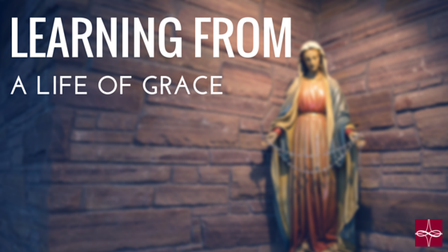
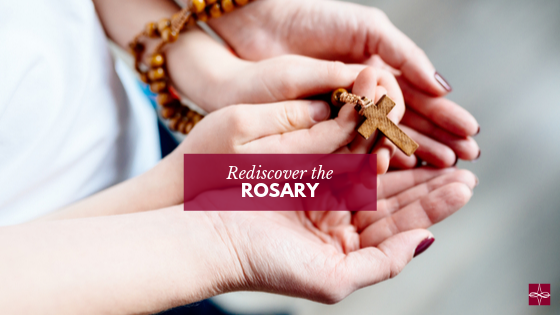



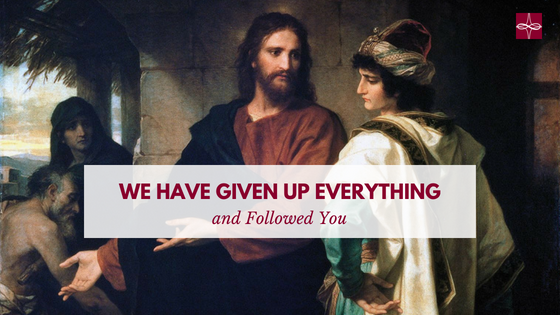

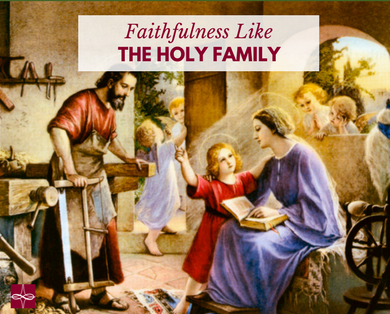
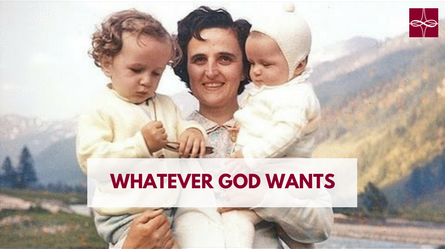
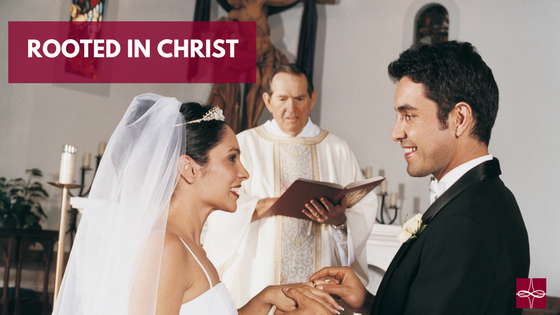
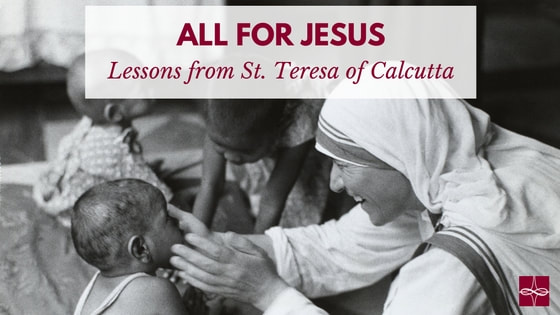
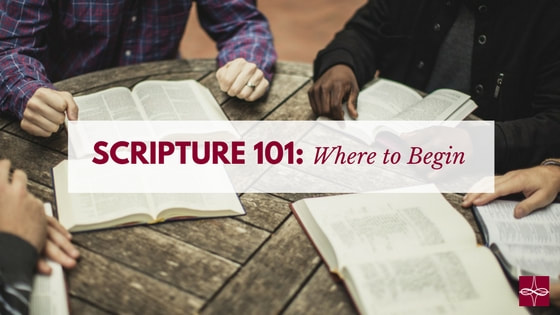
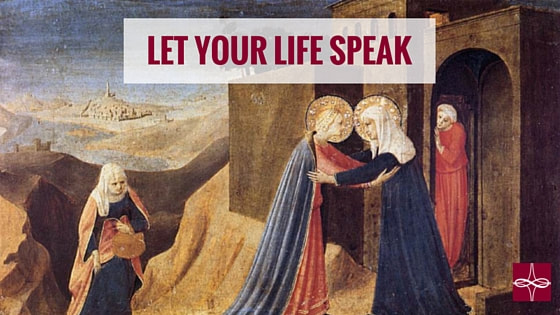
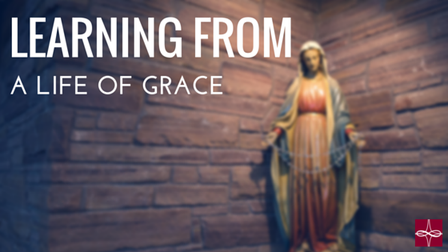


 RSS Feed
RSS Feed